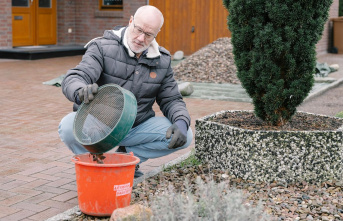In Germany alone, millions of people suffer from a pollen allergy, combined with mild to severe symptoms that can occur seasonally (usually in spring and summer) - in some cases even all year round. While they are completely at the mercy of the tiny particles outdoors, there is certainly the possibility of blocking out a large part of the pollen at home: with a protective grille for windows. Read on to find out exactly how pollen protection grids work and the advantages and disadvantages of the models.
In principle, both variants can be used to make it more difficult for insects to gain access to your own four walls. But what exactly is the difference then? In fact, pollen screens have much finer meshes than fly screens, which are intended to ensure that 80 percent less pollen can penetrate the home. And thus the symptoms of allergy sufferers are significantly reduced - even if not 100 percent. Depending on the supplier, different materials are used for production: such as polyester, fleece, aluminum and fiberglass fabric.
Pollen screens are designed to improve indoor air quality, but they also have their downsides. In the following table you will find the most important cornerstones.
Advantages
Disadvantages
the purchase is comparatively cheap
the view is often clouded
Attaching the pollen screen is easy
the air supply is restricted depending on the material
the materials can usually be cut to size
the glued-on grids can come loose in the wind
the fine meshes are still permeable to air
cleaning is not possible with fixed frames
most models are UV resistant
the quality can vary greatly depending on the manufacturer
the grids keep pollen and insects away
the separation efficiency is not always the same
the materials can often be washed
the pollen load is not reduced by 100 percent
Tip: Read through the following purchase criteria before you buy a pollen screen.
1. The material As mentioned at the beginning, different materials are used for the production of pollen protection grids. They differ not only in price, but also in transparency and air permeability. While polyester lets a lot of light through, it has a shorter lifespan than aluminum, for example.
2. The size There are pollen screens that can be cut to size, but there are also prefabricated models with a frame. Custom-made products are also possible, but cost more accordingly. For this reason, you should measure your windows beforehand to find the right pollen screen for your home.
3. Attachment Depending on the manufacturer, the pollen screens can be easily attached to the windows with Velcro, adhesive tape or magnetic strips. If you choose a model that requires drilling into window frames, you should first ask your landlord for permission if you are renting.
4. Tear resistanceRegardless of the material, all pollen screens are actually relatively robust. However, if you keep pets with claws, you should opt for a particularly stable model that is scratch and tear resistant. Aluminum fabric or fiberglass fabric are more suitable here than polyester and fleece.
5. The transparency When buying a pollen protection grid, pay attention to the transparency. Otherwise it can happen that your rooms are significantly darker after installation than before - which can certainly be an advantage in summer, but is not to everyone's taste.
This article contains so-called affiliate links. Further information are available here.












